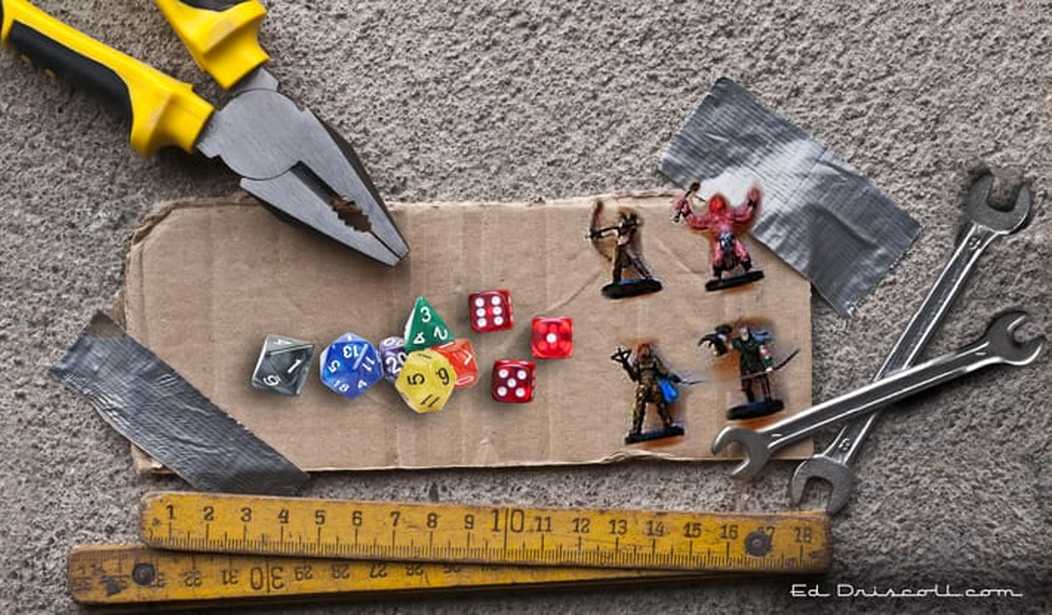Well. We’ve all heard the stories. “My players managed to one-shot the main villain in the first game session.” “My players said the wrong thing at the worst possible time and now there’s a war going on.” “I waved the clues in front of their faces and then they went and did the exact wrong thing anyway.” In short: you messed up somehow as a gamemaster (GM). Oh, sure, players have this frustrating habit of being free-willed sentient creatures who refuse to read your mind. I hate that about them, too. But the job of the GM is to get up, rub some dirt on it, and continue play… so let’s go over some of the stuff that you can do.
Step one: in case it isn’t obvious, lose the attitude. Assuming that you have one, of course; but if you happen to think that GMing is a great way to address your perceived lack of power and agency issues, maybe you shouldn’t GM for a while. Roleplaying games (RPGs) are collaborative exercises (please don’t skip over that line when you’re reading this). And like any collaborative exercise, you have to remember that you’re not the only one that gets to have fun and play with the setting. I note this because so many GM/player problems come from attempts to overcontrol game play. Some control is good; too much is simply awful.
Step two: start smoking. Or suddenly develop a weak bladder, or whatever else works as a handy excuse to take an immediate five minute break. If something horrible for the long-term survival of your campaign happens in-game, then the absolute worst thing that you can do is try to power through it on the spot. Act in haste, repent in leisure, all that. That ‘one-shotted the villain’ example above? Prime example of this kind of issue. If the players don’t know that they just inexplicably managed to kill the main villain, why tell them? Of course, if they do know then you need to figure out a way to make it work anyway (a competent Number Two or Evil Spouse takes the reins, or something) — and you’ll do a better job of thinking it up when you’re outside sucking down a cigarette, or in the bathroom, or getting more soda from the fridge, or anything, really. Basically? Break contact and regroup.
Step three: kill your darlings. One of the banes of bad roleplaying campaigns is trying to overcomplicate things. Elaborate plotlines and schemes are very nice to read out or watch… but they typically work best when you have an actual script. In games — for that matter, in real life — baroque machinations are notoriously unstable. I mention this largely because there’s always a strong impulse to try to make a breaking campaign conform to the really good scenes or monologue opportunities that you really, really wanted to include. Unfortunately, that’s a bad impulse. A good impulse is to rip out the unnecessary stuff and concentrate on just getting the campaign back to the basic story that you wanted to tell in the first place. Trust your good impulses.
And step four? Know when to pull the plug. Some stories you can’t tell in a RPG format. Maybe your campaign was one of them, and you just didn’t realize it at the time. There’s no shame in that. I know that it’s embarrassing when something you do doesn’t work out properly, but you’re playing with friends, right? They should be cool about it. In fact, you have the right to expect that they be cool about it.
One last note: obviously, this article has been assuming throughout that a disastrous RPG campaign is primarily the fault of the GM. But that’s not always true, is it? Players have obligations as well, like respecting the GM’s authority when it comes to the basic kind of campaign being run, showing up on time, not being generally obnoxious… you know, your basic mature, socialized-adult behavior. Put another way: if you’re part of a group that habitually wrecks your (volunteer) GM’s carefully-constructed campaigns simply because you enjoy watching him get frustrated when he can never tell a story… well. I have ten words for you: and you may want to get a pad and a pencil for this one.









Join the conversation as a VIP Member